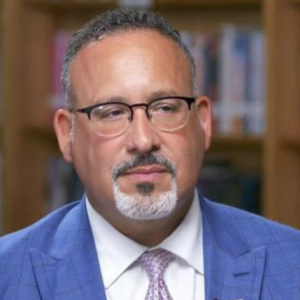For taxpayers, it’s a simple matter of math. They’ve fronted college students hundreds of billions of dollars in loans and will be stuck with the tab if they aren’t repaid.
For the Department of Education, it should be a matter of management. Overseeing the suspension of loan payments during the COVID crisis and helping borrowers get back on the repayment track.
But some members of Congress and critics of the Biden administration say it has become a matter of politics: Outside progressive organizations, led by former Obama education officials, coordinating a campaign with the Education Department to give billions of tax dollars to a group of voters vital to Democrats in 2024.
Congress has been investigating Education Secretary Miguel Cardona and his staff for months over their handling of college debt and what some Republicans believe were politically-motivated policy decisions. Specifically, the House Oversight Committee is looking into the department as it “appears to be seeking legally dubious alternative avenues to make good on President Biden’s campaign promise to cancel federal student debt.”
The U.S. Supreme Court made headlines in June when it struck down President Joe Biden’s plan to have taxpayers bail out college students’ debt, up to $20,000 per borrower. According to the Committee for a Responsible Federal Budget, the estimated cost of Biden’s executive action would have been about $400 billion.
The Biden administration is making no secret of its “Plan B” strategy. Last week, Undersecretary of Education James Kvaal announced the department was moving “as quickly as possible” to craft a new debt relief program in the wake of the Supreme Court’s ruling.
But the fight over college debt forgiveness goes back to the Department of Education’s Sweet v. Cardona settlement, in which the Biden administration agreed to the unquestioned acceptance of 200,000 pending claims, many against for-profit or proprietary “career colleges.” Critics of the settlement say it was partly motivated by ideologues inside the Obama and Biden administrations who oppose for-profit education. They noted the Sweet plaintiffs and the Biden DOE reached the deal in secret.
Also problematic is the central role in the settlement played by Deputy General Counsel for Post Secondary Education Toby Merrill. Before joining the administration, Merrill founded the legal advocacy group that filed the original Sweet class action, Harvard’s Project on Predatory Student Lending (PPSL). In other words, the same person was involved in both filing – and settling – the lawsuit and to his allies’ advantage.
Now it appears the Biden administration plans to take a similarly aggressive approach to widespread college debt bailouts and with the help of some of the same progressive political insiders. And, as in the case of the Sweet settlement, the Department of Education is trying to keep its actions secret.
Last week, Education and the Workforce Committee Chairwoman Virginia Foxx (R-N.C.) and Health, Education, Labor, and Pensions Committee Ranking Member Bill Cassidy, M.D. (R-La.) blasted Cardona for stonewalling multiple requests for a member-level briefing on the Biden administration’s plans to return student loan borrowers to repayment.
“The Education Department is responsible for bringing 43 million borrowers back into repayment. Cardona himself has even admitted that it’s never been done before. Over two years have passed, and no one has seen a plan. As a result, Chairwoman Foxx and Ranking Member Cassidy asked for an in-person briefing. This was the only Foxx-Cassidy in-person briefing made this year. It is clearly a priority for members, and Secretary Cardona blew them off,” a committee spokesperson told InsideSources.
Opponents of broad-based college debt bailouts believe Cardona and his department are once again coordinating with outside activists. On the list is Kvaal, who House sources believe, has been coordinating with former Clinton and Obama education staffers David Halperin and Robert Shireman.
Halperin and Shireman have waged an ideological war on for-profit career colleges for decades. Shireman left his job as deputy undersecretary of education in the Obama administration after he “was caught … playing footsie with a short-seller betting against for-profit colleges,” according to The Wall Street Journal.
His replacement? James Kvaal.
Now House committees are looking into possible coordination between the DOE and Kvaal-aligned activists and whether Halperin and Shireman are violating lobbying disclosure laws by lobbying the department without registering.
Further, emails between Cardona’s agency and Halperin, Shireman, and others suggest the department is once again coordinating its messaging with these outside liberal activist organizations as it did during the Obama administration.
And Shireman’s problematic actions of coordinating with outside groups to push gainful employment rules on proprietary colleges while serving as undersecretary have previously come under House committee scrutiny.
The unwillingness of the Department of Education to answer questions is raising suspicions about its actions yet again.
“This stonewalling is unacceptable. The Biden administration has had years to prepare for borrowers to return to repayment and are either refusing to show their plan or worse, they have no plan at all,” said Cassidy. “The department doesn’t get to ignore their job and then escape accountability. Inaction by the department will only harm the 43 million student loan borrowers they oversee.”

